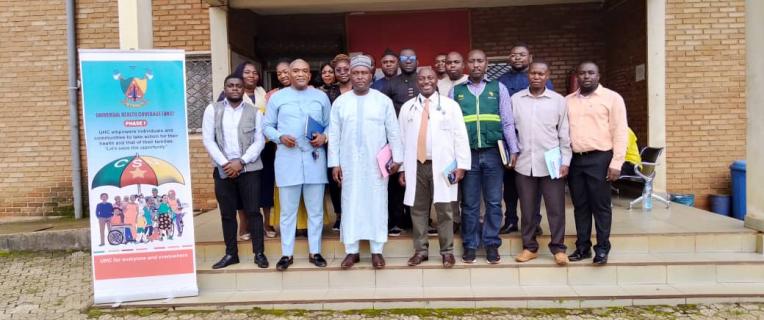An orientation meeting on the UHC Health Voucher Scheme: a way to reduce maternal and neonatal mortality in the North West Region? "Chèque Santé "

An orientation meeting, chaired by the Regional Delegate of Public Health, Dr. Che Soh Kingsley, regarding the start of the health voucher mechanism in the North West Region, took place on June 16, 2024, in the conference room of the North West Regional Delegation of Public Health. Attendees included the Regional Assembly Representative, the Administrator of the North West Regional Fund for Health Promotion, the Director of the Regional Hospital Bamenda, the Chief of the Health Control Brigade, the District Officers for the Bamenda and Bamenda 3 Health Districts, all Health Programme Heads, and all the sections and unit heads of the Regional Technical Unit for Universal Health Coverage Phase I.
The meeting's main goal was to inform the regional actors about the Health Voucher Mechanism, which is an extension of Universal Coverage Intervention Packages. The statistical data indicates that a mere 58 to 60% of pregnant mothers seek antenatal care (ANC) in health facilities, hence decreasing the likelihood of receiving care from a qualified healthcare provider. Pregnant women's low attendance at health services can be explained by their financial and geographic accessibility.
On this backdrop, the health voucher mechanism is being introduced in the UHC interventions package of the region to stimulate demand for ANC services, reduce the financial barriers experienced by many of these pregnant women, and, above all, to curtail mother and child deaths in the region. It is worth mentioning that the Health Voucher Scheme is a prepayment mechanism aimed at reducing maternal and neonatal mortality through the provision of holistic care to pregnant women.
The presentation during the meeting addressed the purpose of the health voucher scheme in our setting, the project's operational goals and objectives, its definition, the services it provides, its cost, its functions, the stakeholders involved in its implementation at every level of the health pyramid, and the roles of key actors.
Discussions during the meeting centred on:
1. Ensuring good mastery of the implementation of the health voucher scheme by all stakeholders
2. Developing strategies to improve the pre-enrolment and enrolment of targets, especially pregnant women,.
3. Developing plans to mobilise local resources from elites and organised institutions to purchase health vouchers and distribute them to needy pregnant women.
At the end of the discussions, recommendations were formulated to address bottlenecks in the pre-enrolments and enrolments of UHC beneficiaries so that there is no spillover to the health voucher mechanisms.
The next steps in the implementation of the health voucher scheme include:
1. Training of actors
2. Accreditation of health facilities
3. Signing of contracts with accredited health facilities.
At the end of the meeting, the regional delegate opined that ‘’there is no room for failure; it is a bigger challenge to succeed in the crisis; our women need the HVS more’
Le Minsante

la santé, un avenir prometteur.
la vision de développement à long terme du Gouvernement est l’accession du Cameroun au stade de pays émergent aussi bien du point de vue économique qu’industriel à l’horizon 2035. Dans cette perspective, le rôle du secteur de la santé est fondamental dans la mesure où il ne saurait y avoir de développement sans une bonne santé des populations.
Notes d'information / Communiqués
- Circular letter of warning substandard drugs
- Lettre circulaire relatif à l'alerte sur un médicament de qualité inférieure
- Resultats concours infirmier specialiste 2025
- Press release
- Communiqué de presse
- Press release by a seasonal upsurge in influenza
- Communiqué radio presse recrudescence saisonnière de la grippe
- BULLETIN TRIMESTRIEL SANTE DE REPRODUCTION MATERNELLE, NEONATALE, INFANTO-JUVENILE ET DE L’ADOLESCENT

























